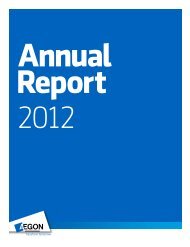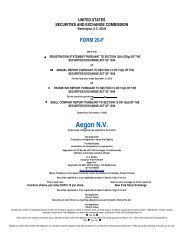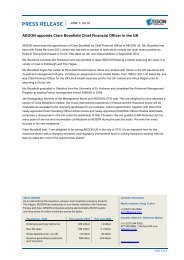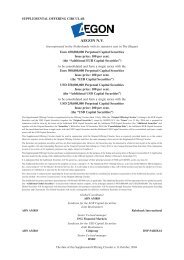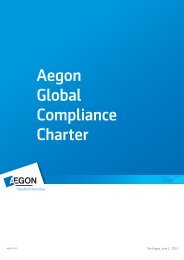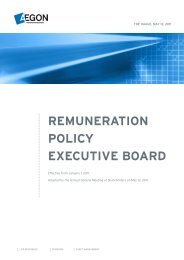20130704 Charter MB - Aegon
20130704 Charter MB - Aegon
20130704 Charter MB - Aegon
Create successful ePaper yourself
Turn your PDF publications into a flip-book with our unique Google optimized e-Paper software.
<strong>Charter</strong><br />
Management<br />
Board<br />
GLOBAL<br />
COMPLIANCE<br />
CHARTER<br />
aegon.com<br />
The Hague, May 31, 2013
Contents<br />
Clause<br />
Introduction 3<br />
1. Composition and appointment 4<br />
2. Role of the Management Board 4<br />
3. Role of the Executive Board 5<br />
4. Management Board Meetings 6<br />
5. Company Secretary 7<br />
6. Relation with the Supervisory Board 7<br />
7. Other provisions 8<br />
2
Introduction<br />
<br />
This <strong>Charter</strong> was adopted by the Executive Board and the Management Board on September 16 2009 and confirmed<br />
by the Supervisory Board on September 23 2009, and amended on May 31 2013.<br />
<br />
This <strong>Charter</strong> sets out the governance of the Management Board of <strong>Aegon</strong> in addition to the relevant provisions<br />
of Dutch law, the Articles of Association and the Executive Board <strong>Charter</strong>. In the performance of their duties, the<br />
members of the Management Board will observe the provisions of this <strong>Charter</strong>.<br />
<br />
In addition to complying with this <strong>Charter</strong> and any applicable rules and protocols, the Management Board shall<br />
ensure that there is an atmosphere of cooperation and agreement, characterized by mutual supportiveness, in order<br />
to support the individual and shared responsibilities of the Management Board members.<br />
<br />
Any term used herein shall have the same meaning as such term is used or defined in the Articles of Association,<br />
whereby: “Group” means <strong>Aegon</strong> N.V. together with, where appropriate, the subsidiaries and possible other companies<br />
of which financial information is included in the consolidated financial statements of the Company and “Company”<br />
means <strong>Aegon</strong> N.V. The Chairman of the Executive Board is also referred to as “CEO”.<br />
3
1. Composition and appointment<br />
1.1 The Management Board consists of (i) the members of the Executive Board and (ii) such other members as appointed to<br />
the Management Board by the Executive Board after consultation with the Supervisory Board.<br />
1.2 The members of the Management Board can be suspended or dismissed from the Management Board by the Executive<br />
Board.<br />
2. Role of the Management Board<br />
2.1 The Management Board is entrusted with the overall strategic direction of the Group, more in particular with respect to:<br />
(a) setting, implementing and achieving the Group’s business objectives and strategy as well as ensuring the delivery of<br />
results;<br />
(b) discussing and sponsoring the Group’s policies;<br />
(c) discussing and sponsoring enterprise risk management, in particular:<br />
(i) embedding of risk strategy into business strategy and enterprise risk management into business operations;<br />
(ii) reviewing risk governance structures, risk tolerance statements, group level risk policy limits, the pricing and<br />
product development policy, and any changes in risk methodology with an impact on economic available or<br />
required capital in excess of EUR 200 million;<br />
(iii) supervising compliance with the enterprise risk management framework and policies.<br />
(d) corporate responsibility issues that are relevant to the Group;<br />
(e) sharing relevant information and;<br />
(f) providing vital support and expertise and making recommendations to Management Board members on strategic<br />
business matters and to the Executive Board on all strategic matters that affect the business of the Group<br />
(e.g. cross border business initiatives, capital allocation and M&A.<br />
(g) Each individual Management Board member is accountable for the operations and management in the unit(s) that<br />
the member is responsible for, in line with the Company’s policies, values and principles, and compliance standards.<br />
2.2 Management Board members are collectively responsible for managing <strong>Aegon</strong>’s senior leadership talent. Members have a<br />
responsibility to manage talent consistently at all <strong>Aegon</strong> businesses around the world. This includes the prior approval of<br />
the Management Board for:<br />
(a) the appointment or dismissal of key direct reports of the CEO’s, as defined by the Management Board from time to<br />
time, and<br />
(b) the appointment or dismissal of all Group Staff department’s heads.<br />
2.3 The Management Board shall have full information rights vis-à-vis all countries and business lines within the Group. The<br />
Management Board shall, in performing their duties, have access to the expertise of and support and services from all<br />
Group Staff departments.<br />
4
2.4 In the performance of their responsibilities the Management Board shall act in accordance with the interests of the Group<br />
and the business connected with it, taking into consideration the interests of the Group’s stakeholders. The members of<br />
the Management Board shall externally express concurring views with respect to important affairs, matters of principle<br />
and matters of general interest in accordance with the final decision taken, with due observance of each member’s<br />
individual responsibilities.<br />
3. Role of the Executive Board<br />
3.1 The Executive Board is the "Bestuur" of the Company and the members of the Executive Board are the "Bestuurders"<br />
as referred to in the Articles of Association and in the Dutch Civil Code. The responsibility for the fulfillment of their<br />
responsibilities is vested collectively in the Executive Board. The Executive Board is accountable to the Supervisory Board<br />
and the General Meeting of Shareholders.<br />
3.2 The Executive Board is authorized to legally represent <strong>Aegon</strong> N.V.<br />
3.3 In performing its duties as Executive Board, the Executive Board shall - as its standard practice but without prejudice to its<br />
responsibilities under Dutch law - consult with the Management Board and obtain the advice and input of the Management<br />
Board before taking decisions on all matters of business that affect the overall business of the group (e.g. capital<br />
allocation and M&A).<br />
3.4 Without prejudice to article 3.3, the Executive Board shall be responsible for:<br />
(a) informing the Management Board about Executive Board decisions;<br />
(b) the strategy of the Group;<br />
(c) the aggregate budget of the business units and companies within the Group;<br />
(d) the aggregate financial results of the Group worldwide;<br />
(e) performance management of the Group and reporting by each member of the Management Board and by the heads<br />
of country or regional units or business lines;<br />
(f) setting Group policies;<br />
(g) enterprise risk management, in particular:<br />
(i) embedding of risk strategy into business strategy and enterprise risk management into business operations;<br />
(ii) approving risk governance structures, risk tolerance statements, group level risk policy limits, the pricing and<br />
product development policy, and any changes in risk methodology with an impact on economic available or<br />
required capital in excess of EUR 200 million;<br />
(iii) supervising compliance with the enterprise risk management framework and policies.<br />
(h) setting frameworks for product pricing and capital efficiency;<br />
(i) the compliance by the Group with all relevant laws and regulations;<br />
(j) the preparation and timely publication of the financial statements and interim results and other information relating<br />
to the Group that needs to be reported and disclosed and determining the dividend policy and annual and/or interim<br />
dividend distributions;<br />
5
(k)<br />
(l)<br />
(m)<br />
(n)<br />
(o)<br />
reporting on all relevant matters of the Group (including but not limited to the operational and financial objectives<br />
of the Group, the strategy designed to achieve the objectives and the associated risk profile, the parameters to<br />
be applied in relation to the strategy, financial performance, risk management, risk control systems, corporate<br />
governance etc.) to the Supervisory Board and the Committees of the Supervisory Board, and the Executive Board<br />
shall as such be the first point of contact for the Supervisory Board;<br />
ensuring that members of the Management Board report on the results and fulfillment of their individual functions<br />
and responsibilities;<br />
the adequate functioning of such specialists’ committees as established by the Executive Board from time to time,<br />
such as the Group Risk and Capital Committee, the Enterprise Risk Management Committee and the Disclosure<br />
Committee;<br />
managing the heads of all Group Staff departments;<br />
the resolutions and matters expressly vested in the Executive Board in this <strong>Charter</strong>, the Executive Board <strong>Charter</strong>, the<br />
Articles of Association and Dutch law, including, but not limited to, its decision making process, the legal structure,<br />
and the corporate governance structure of the Company and the Group.<br />
3.5 The Chief Risk Officer is invited for Executive Board meetings when enterprise risk management and related matters are<br />
on the agenda. The Chief Risk Officer has a reporting line into the Supervisory Board Risk Committee to discuss enterprise<br />
risk management and related matters.<br />
3.6 The Executive Board shall regularly, but at least once per year, review and assess the performance of the Executive Board<br />
and the Management Board, as well as the effectiveness of the corporate governance structure of the Group.<br />
4. Management Board Meetings<br />
4.1 The Management Board shall in principle meet two times per month or more often as deemed desirable or required by<br />
the CEO. Members will do their utmost to be present at these meetings in person, by video and telephone conferencing or<br />
other media.<br />
4.2 Meetings of the Management Board shall be called by the CEO. All members of the Management Board may ask the<br />
CEO to call a meeting or suggest topics for the agenda. In principle, the agenda for a meeting shall be sent at least<br />
three calendar days before the meeting. Whenever relevant and possible, an explanation in writing and/or other related<br />
documentation should be attached for each item on the agenda.<br />
4.3 The CEO acts as the chairman of the meetings of the Management Board. If the CEO is absent, the CEO will appoint the<br />
CFO as chairman for that meeting.<br />
6
4.4 Before decisions are made, the Management Board not only seeks the agreement of the members, but also the resolution<br />
or mitigation of minority objections. All members have an equal vote, however, decisions by the Management Board need<br />
to be endorsed by the CEO and the CFO. Any of the following decisions also need to be endorsed by the Chief Risk Officer:<br />
(a) updates of or changes to the enterprise risk management framework and policies;<br />
(b) resolution of risk compliance matters such as breaches of risk tolerance and group level risk policy limits;<br />
(c) any other business decision that would result in a risk compliance matter if taken.<br />
4.5 A Management Board member may be represented at meetings by another Management Board member holding a proxy in<br />
writing or by a verbal confirmation to the Company Secretary.<br />
4.6 The admittance to the meeting of persons other than the Management Board members and the Company Secretary or his<br />
or her deputy shall be decided by the CEO.<br />
4.7 The Company Secretary or any other person designated for such purpose by the chairman of the meeting shall draw up<br />
minutes of a meeting of the Management Board.<br />
5. Company Secretary<br />
5.1 The Management Board is assisted by the Company Secretary.<br />
5.2 All Management Board members have access to the advice and services of the Company Secretary.<br />
5.3 The Company Secretary sees to it that correct procedures are followed and that the obligations of the Management<br />
Board, the Executive Board and the Supervisory Board under the law, as well as the Articles of Association and the<br />
applicable <strong>Charter</strong>s are complied with. The Company Secretary shall assist the CEO in the organization of the affairs of the<br />
Management Board and Executive Board (the preparing and reporting of meetings, information etc.).<br />
5.4 The Company Secretary may delegate his duties under this <strong>Charter</strong>, or parts thereof, to a deputy appointed by him in<br />
consultation with the CEO.<br />
6. Relation with the Supervisory Board<br />
6.1 The CEO shall be the first contact for the Supervisory Board and its Chairman.<br />
6.2 In relation to the provision of information and the exercise of duties and powers by the Supervisory Board and its members<br />
and its Committees, the Executive Board, the Management Board and their members shall act in accordance with the<br />
provisions of this <strong>Charter</strong>, the Supervisory Board Rules, the <strong>Charter</strong>s of the various Supervisory Board Committees, the<br />
Articles of Association and the applicable laws and regulations.<br />
7
7. Other provisions<br />
7.1 Members of the Management Board shall adhere to the Code of Conduct of <strong>Aegon</strong> N.V. that is applicable to all <strong>Aegon</strong><br />
employees, as it shall be in place from time to time.<br />
7.2 The Management Board may occasionally deviate from this <strong>Charter</strong>, with due observance of applicable laws and<br />
regulations and with the prior approval of the CEO. Material deviation from, as well as amendments to this <strong>Charter</strong> may be<br />
made by the Executive Board, subject to prior consultation of the Supervisory Board.<br />
7.3 This <strong>Charter</strong> is governed by the laws of the Netherlands. The courts of the Netherlands have exclusive jurisdiction to<br />
settle any dispute arising from or in connection with this <strong>Charter</strong> (including any dispute regarding the existence, validity or<br />
termination of this <strong>Charter</strong>).<br />
7.4 This <strong>Charter</strong> is complementary to the provisions as contained in Dutch law, other applicable Dutch or EU regulations and<br />
the Articles of Association and the Executive and Supervisory Board <strong>Charter</strong>s. Where this <strong>Charter</strong> is inconsistent with<br />
Dutch law, other applicable Dutch or EU regulations or the Articles of Association, and the Executive and Supervisory<br />
Board <strong>Charter</strong> the latter shall prevail. Where this <strong>Charter</strong> is consistent with the Articles of Association and the Executive<br />
and Supervisory Board <strong>Charter</strong>s, but inconsistent with Dutch law or other applicable Dutch or EU regulations, the latter<br />
shall prevail.



